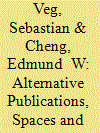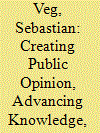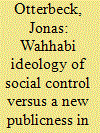|
|
|
Sort Order |
|
|
|
Items / Page
|
|
|
|
|
|
|
| Srl | Item |
| 1 |
ID:
179282


|
|
|
|
|
| Summary/Abstract |
Reviewing the extant literature on China's public sphere from the perspective of 20th-century history and social science, this introductory essay argues for the continued relevance of studying the publications and public practices associated with knowledge communities. By steering away from normative definitions and by envisaging publicness as a process, a connection can be explored between social discourses and political practices in China. Discursive communities, based on shared identity or sociability, may appear marginal, but at key moments they can play a unique role in modifying the dynamics of political events.
|
|
|
|
|
|
|
|
|
|
|
|
|
|
|
|
| 2 |
ID:
179283


|
|
|
|
|
| Summary/Abstract |
Situated far from coastal cities and foreign concessions, Chengdu yields insights into the role of the local press and its specific publics in the political evolution of the late Qing and early Republic. Despite its remote location, Chengdu developed its own modern press in the late Qing, relying on print entrepreneurs and modern journalists recruited from the ranks of the local literati and traditional sociability, in particular teahouses. They all played a role in forming a modern reading public which came to understand itself as a distinct local political community in dynamic interaction with national politics and transnational networks. The local press evinced three successive but intertwined ideals of publicness: as a link between the state and the people and a vector of enlightenment, as a professional forum for public opinion and as a tool for political mobilization. In solidifying public opinion around the local community, the press served as a forum and catalyst for political activism in the 1911 Railroad Protection movement and the 1919 May Fourth movement, events which were shaped as much by local dynamics as they were by national developments.
|
|
|
|
|
|
|
|
|
|
|
|
|
|
|
|
| 3 |
ID:
181455


|
|
|
|
|
| Summary/Abstract |
Energy transitions require a rethinking of the role of public authorities to integrate public views and concerns. Through a case study in Geneva, Switzerland, this article examines how the public sees the role of the public authority in the transformation of a local energy system by developing a canton-wide geothermal program. We use a public values perspective, identifying public values linked to the roles and responsibilities of the state. Analyzing public values allows understanding how the public perceives state actions and consequently how the authority may adequately respond and accommodate these expectations and doing so, anchor policies in public values. We begin by exploring the concepts of public value and posing the contextual background. The article then presents the most salient public values linked to the roles and responsibilities of the authorities based on focus group data. For residents the most important function of the public authority in relation to energy transitions is to inform and raise awareness. Other important functions are providing financial support and regulating. Acknowledging the importance of communication and its associated values allows public authorities to set the anchor to then effectively roll out, plan or support energy transition projects.
|
|
|
|
|
|
|
|
|
|
|
|
|
|
|
|
| 4 |
ID:
119169


|
|
|
|
|
| Publication |
2012.
|
| Summary/Abstract |
To understand Saudi Arabian Wahhabi theology, it needs to be contextualized. This article explores the discussion about music in Saudi Arabia in order to illuminate the political theory of the social of Wahhabi theology and the ongoing transformation of Saudi publicness. Since Wahhabism has singled out music as one of the abominations of society to be avoided by the believer, the changing soundscapes of the kingdom as music becomes a more common public presence has becomes a hot topic of discussion. By looking at the common Wahhabi stand on music and comparing it with both new practices and a new discourse represented by the scholar al-Kalbani, it becomes clear how a plurality of opinions challenge established Wahhabi agendas in a new publicness. This, in its turn, makes it relevant to investigate the logic of the political vision of the social that the official Wahhabi scholars have. I argue that this Wahhabi theology needs to be understood in the framework of its view on the human psyche and in relation to its concept of sin. I further argue that a renegotiation of positions is taking place, since negative judgments about music are not internalized in the population to the extent scholars might wish for or envisage.
|
|
|
|
|
|
|
|
|
|
|
|
|
|
|
|
|
|
|
|
|